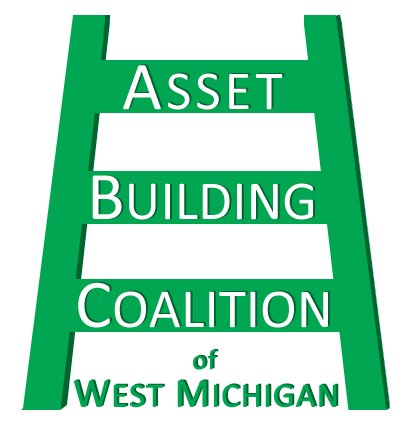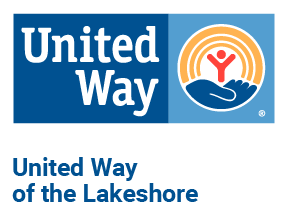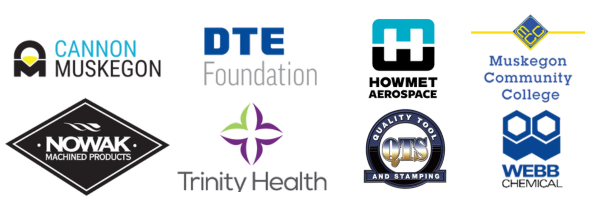Education, income and health are the building blocks for a good life. An income adequate to pay for today’s necessities and save for the future provides families some sense of financial stability. United Way’s 10-year goal, set in 2008, is to cut the number of financially unstable working families by half. This requires strategies to help people increase income, save, and grow long-term assets.
Asset Building Coalition:
 The mission of the Asset Building Coalition (ABC) of West Michigan is to promote the building of financial, property, social and personal assets to create prosperity for individuals, families and the community through advocacy, awareness, education, and collaboration.
The mission of the Asset Building Coalition (ABC) of West Michigan is to promote the building of financial, property, social and personal assets to create prosperity for individuals, families and the community through advocacy, awareness, education, and collaboration.
Initiative and Programs the ABC is involved with:
VITA (Volunteer Income Tax Assistance) Program
Free tax preparation for low- to moderate-income households and individuals. The program operates during tax season. If a family makes under $52,000 they may utilize this service. There are sites at various locations covering Muskegon, Newaygo, and Oceana. To sign up for a tax appointment, call CALL211 by dialing 2-1-1 or toll-free at 1-877-211-5253.
Show Me the Money Day
Event to kick off the VITA Services of West Michigan tax season. The goal of the event is to connect individuals with resources for them to gain a stronger financial future.
Bank on Initiative
Promote access to affordable and appropriate financial services and basic consumer credit products for households lacking access.
Emergency Needs Committee
Coordinated by United Way of the Lakeshore, the Emergency Needs Committee focuses on improving the systems and services designed to provide direct support for basic needs. Members of non-profits, government agencies, and the faith-based community meet bi-monthly to identify emerging needs and advocate for strategies to provide solutions for our residents facing a crisis. A basic needs crisis is defined as being at-risk of or lacking food, shelter, utilities or clothing.
The Emergency Needs Committee serves as the local board to oversee Emergency Food and Shelter funds from the Emergency Food and Shelter Program (EFSP).
Subcommittees of the Emergency Needs Committee:
Case Management Committee: meets bi-monthly to discuss specific cases and ways to better empower people facing self-sufficiency issues. Provides updates and insight on the challenges/objects of welfare-to-work families.
Emergency Food/Pantries Committee: meets bi-monthly to coordinate the food drives in the community, the food mobiles throughout the County, meal sites and times, holiday meals and food assistance programs. The committee consists of food pantry providers, meal sites, the Department of Human Services, and other social service providers and faith-based organizations that provide assistance.
Summer Youth Nonprofit Work Experience
The Summer Youth Nonprofit Work Experience is a collaborative effort sponsored by the DTE Energy Foundation through the United Way of the Lakeshore in partnership with Michigan Works! in both the West and West Central regions. Teens and young adults are placed at different nonprofit organizations to work 32 hours per week for six weeks during the summer. These are hard to place young workers from low socio-economic backgrounds who might not have had a work opportunity if not for the Summer Youth Nonprofit Work Experience. The recently released Kids Count Databook for 2016 shows that nearly one-in-four Michigan youth are living in poverty. Those numbers are even more daunting for our region. This concerns us as we work to inspire change and build thriving communities. The research shows that at-risk youth who miss out on an early work experience are more likely to endure economic instability and unemployment later in life. At the United Way of the Lakeshore, we have a bold goal to see 10,000 more working families are able to meet their basic needs by 2025. That’s why this program is vital. It helps to change the trajectory for many youths.
For the summer employment program, low-income youth employees aged 16-24 are recruited by Michigan Works! in target areas like Muskegon, Muskegon Heights, Big Rapids, and Baldwin, and Oceana and Newaygo Counties. This year we are also adding a few new positions from Kent County as well, making this a 6-county program.
Besides employment, the youth are also enrolled in on-going career development in areas like interviewing, building a resume, developing a list of references for prospective employers; and, they are also provided with supportive services that include remediation, clothing for work, credit recovery, and other areas. The aim of these efforts and services are to help youth fully participate and be successful. In addition to the work experience and career development, each week the summer nonprofit employees also have workshops where soft and hard skills are emphasized. The workshops follow a curriculum from the Michigan Works! JMG (Jobs for Michigan’s Graduates) program that includes soft skills like: team building, appropriate communications, and being on time and time management; and, hard skills like banking and budgeting, writing, customer service, character building, dressing appropriately for the workplace, and cultural skills in anti-bullying, diversity and inclusion, were also part of the training.
With Michigan Works! as collaborative partners, the DTE Energy youth employees are dual enrolled in the Michigan Works! Workforce Investment Act Program. This gives youth the opportunity to continue their involvement in youth services after the summer employment program while they complete high-school, enroll in post-secondary education, or gain long-term employment.
Our United Way provides staff support to the weekly programming in Muskegon around service learning to engage the youth in planning and project development, presenting their projects to local City Councils and the County Commission, recruiting volunteer support, engaging the media and completing the project as a team. We expect to engage the community, the nonprofits in the community and a team from the National Community Conservation Corps of the Corporation for National Service. In the northern area, we will again engage in a partnership with the Seeds Program – also a national service program – that collaborates to provide transportation to the youth. In addition, the youth in the Seeds program earn scholarships for educational training. We expect to have youth employed in public service in Oceana and Newaygo Counties as well. In Mecosta County, we will have summer participation at the Jim Crow Museum at Ferris State University.
Earned Income Tax Credit
Worker Tax Credit a Boost to Local Economy
At the United Way of the Lakeshore, we fight for many working women and men who work hard at low-wage jobs yet can barely make ends meet. They find it nearly impossible to cover even essentials such as food, transportation to and from work, and electric bills. We know them as ALICE – Asset Limited, Income Constrained, Employed. They work in all areas of our economy and throughout our community.
One way we help struggling workers in our community is by connecting them with the federal Earned Income Tax Credit (EITC). It’s one of our most effective tools to keep people working and help them get a fair shot at a decent life. Each year we connect individuals and families to the EITC through the Volunteer Income Tax Assistance (VITA) program run locally by Goodwill Industries. Last year, this resulted in more than $2 million coming back to our community. All it takes is a simple call to 2-1-1 to schedule a VITA appointment to help prepare one’s taxes. There are income eligibility requirements for the free service.
Though many will qualify, the EITC entirely shuts out millions of working people who are not raising children. For example, noncustodial parents who want to provide more support to their children receive very little from the credit, and young childless workers aged 21-24—many of whom are struggling to get a foothold in the workforce—are completely ineligible for the EITC.
Expanding the EITC to include workers not raising children would give more working people in our area the financial stability to cover the basics, build a better future for themselves and their loved ones, and contribute more to our local economy. Studies show that the EITC helps working people buy necessities like food and gas from local businesses, which in turn helps our local economy grow.
At United Way of the Lakeshore, we know these aren’t just numbers. They are real people with real stories. A stronger EITC would reward the hard work of people—young and old, male and female, from every background—who do essential, low-wage jobs in schools and office buildings and on construction sites to keep our economy running.
As our leaders in Washington, D.C. look for ways to help hardworking people like ALICE in the next year, we hope that they support expanding the EITC for workers not raising children. It’s good for workers and its good for our local economy.

